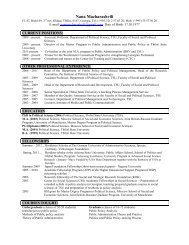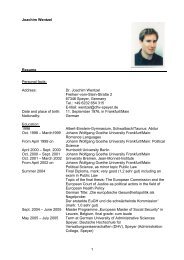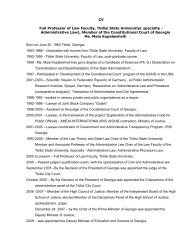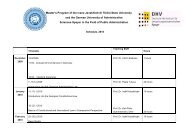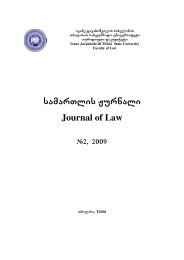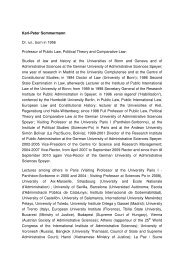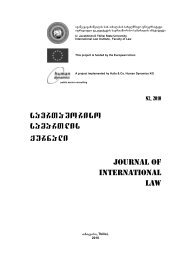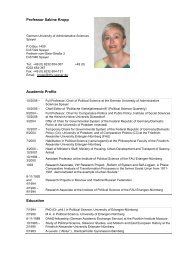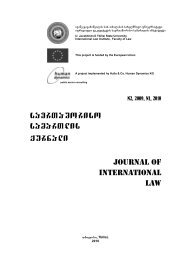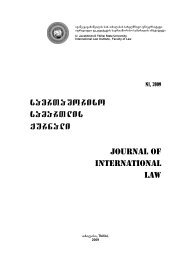Untitled
Untitled
Untitled
Create successful ePaper yourself
Turn your PDF publications into a flip-book with our unique Google optimized e-Paper software.
saerTaSoriso samarTlis Jurnali, #1, 2008 JOURNAL OF INTERNATIONAL LAW, N1, 2008<br />
EKA SIRADZE<br />
JURISDICTION OF THE COASTAL STATE OVER THE SHIP<br />
OF FOREIGN STATE IN THE INTERNAL WATERS AND<br />
THE TERRITORIAL SEAS IN ACCORDANCE WITH THE UNITED<br />
NATIONS CONVENTION ON THE LAW OF THE SEA OF 1982<br />
INTRODUCTION<br />
As it was stated by Mr. Tommy B. Koh,<br />
President of the Third United Nations Conference<br />
on the Law of the Sea, in December 10<br />
1982, 1 new record in the history of jurisprudence<br />
has been created. 2<br />
The UN Convention on the Law of the Sea 3<br />
adopted by the conference, together with other<br />
values has rather important characteristics:<br />
The Convention does not give an opportunity<br />
to any State irrespective of its geographic situation,<br />
political strength and level of marine<br />
development to enjoy only the rights and not<br />
to be bound with relevant obligations before<br />
the less developed and weak States. And one<br />
more important aspect is that it has played the<br />
greatest role in creation of new norms and<br />
many of these norms have become the norms<br />
of customary law. The Convention is considered<br />
as comprehensive political and legal paper,<br />
which includes directives for international<br />
relations, policy and law. It establishes new<br />
international control over the world ocean. 4<br />
The aim of this paper is to discuss the Articles<br />
of the Convention on the jurisdiction of<br />
the coastal State over the ship of foreign State<br />
in its internal waters and the territorial seas,<br />
in the present format, where the coastal States<br />
have recognized sovereignty, though the<br />
scopes of this sovereignty and execution of<br />
own laws by the States becomes a subject of<br />
dispute.<br />
The most serious conflicts in the field of<br />
the law of the sea has taken place as a result<br />
of intersection of these two fundamental principles<br />
– territorial sovereignty and independence<br />
of the seas. 5<br />
INTERNAL WATERS<br />
Activity of any State on domestic or international<br />
level is based on the principle of sovereignty.<br />
The problem arises when interests<br />
of one or more sovereign subjects of international<br />
law intersect each other.<br />
As the territorial sovereignty entitles a<br />
State to exercise its jurisdiction in the most<br />
comprehensive manner, the central role is given<br />
to determine to what level the influence of<br />
the coastal State extends.<br />
Baselines perform this function, i.e. provide<br />
for an opportunity of measurement in order to<br />
determine where the coastal State has an absolute<br />
jurisdiction and where it exercises its<br />
rights simultaneously with other States.<br />
Due to the most of coastlines of the States<br />
are indented, fringed by the islands, gulfs or<br />
mouths of river, ports and etc. there are two<br />
types of baselines normal and straight.<br />
In accordance with Article 5 of the Convention,<br />
baselines used for measuring the<br />
breadth of the territorial sea is the low-water<br />
line along the coast as marked on large-scale<br />
charts officially recognized by the coastal State.<br />
Following to Article 8 of the Convention,<br />
waters on the land ward side of the baseline<br />
of the territorial sea form part of the internal<br />
i.e. national waters of the State, from which<br />
the breadth of the territorial sea and all other<br />
zones are measured. Therefore, internal waters<br />
include gulfs, mouths of river, ports, islands<br />
etc. 6<br />
The coastal State while considering the<br />
issue of jurisdiction, first of all should determine<br />
whether all ships enjoy the same status<br />
or not. Following to the Convention warships<br />
and other government ships operated for non-<br />
92



